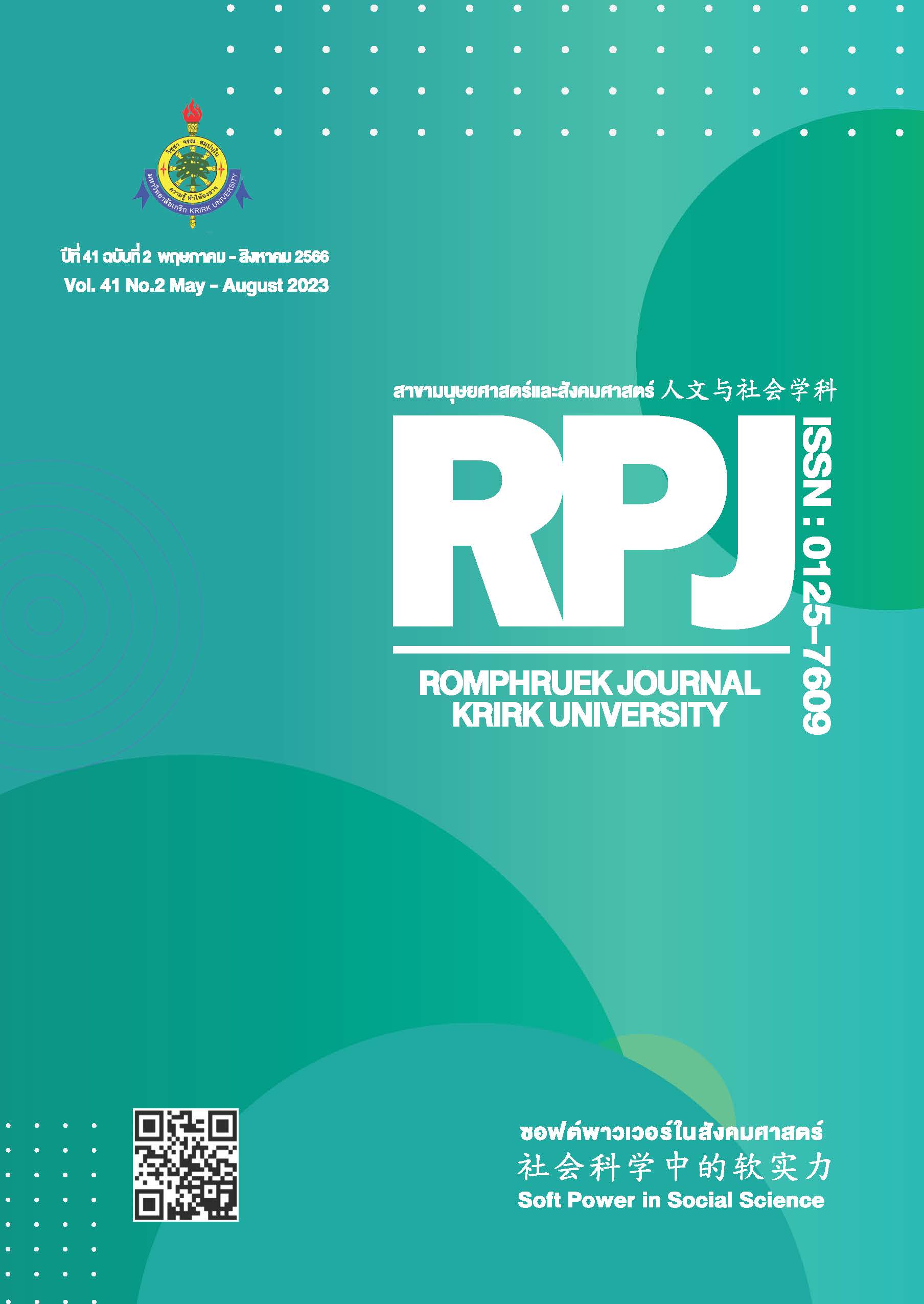A Review of Research Paradigms in the Social Sciences
Main Article Content
Abstract
This article aimed to review the social science research paradigm. It is essential that the research process must create academic values and respond to the needs of society. The study focused on ideology, interpretivism, constructivism, and pragmatism paradigms. It analyzed ontology philosophical perspective and epistemology in social sciences, whether through quantitative, qualitative methodology research or participatory action research. The paradigm analysis revealed that to maximize the use of theoretical value for society, the advantages, disadvantages, and different purposes of use should be considered. Moreover, the researchers with skills in combining research methodologies would enable research results to respond to problems and be valuable in driving society toward sustainable development.
Article Details

This work is licensed under a Creative Commons Attribution-NonCommercial-NoDerivatives 4.0 International License.
Every article published in the Romphruek Journal of the Humanities and Social Sciences is the opinion and point of view of the authors. Thery're not the viewpoint of Krirk University or the editored department. Any part or all of the articles for pablication must be clearly cited.
References
วิเชียร จันทะเนตร นารี เป็งตะพันธ์ กิตติศักดิ์ รัฐประเสริฐ และอิสระ สุวรรณบล. (2564). การปกครองชีวญาณ: ศิลปะการปกครองขององค์กรปกครองส่วนท้องถิ่น. การประชุมเกริกวิชาการระดับชาติ ประจำปี พ.ศ. 2564 วันที่ 18 ธันวาคม 2564 ณ มหาวิทยาลัยเกริก กรุงเทพฯ, 476-485.
สุมาลี ไชยศุภรากุล. (2558). กระบวนทัศน์การวิจัยทางสังคมศาสตร์. วารสารเกษมสาร, 21(40), 1-8.
Archer, M. S. (1995). Realist social theory: The morphogenetic approach. Cambridge, Cambridge University Press.
Baqi, R. (2021). Participation of community members in planning and implementation of emergency response projects in Kurdistan Region of Iraq- COVID-19 response. Dissertation, University of Salford, United Kingdom.
Bhaskar, R. (1979). The possibility of naturalism. New York: Routledge.
Bhaskar, R. (2008). A realist theory of science. New York: Routledge.
Burns, N., Grove, S. K. (2011). Understanding nursing research (4rd.). Philadelphia: Saunders.
Cohen, J. (2007). Interdisciplinary psychoanalysis and the education of children: Psychoanalytic and educational partnerships. Psychoanalytic Study of the Child, 62(1), 180-207.
Cohen, L., Manion. L., & Morrison, K. (2011). Research methods in education. London: Routledge.
Creswell, J. W. (2007). Research design: Qualitative and mixed methods approaches. London: Sage.
Creswell, J. W. (2014). Research design: Qualitative, quantitative and mixed method approaches (4rd.). California : Thousand Oaks.
Crotty, M. (1998). The foundations of social research: Meaning and perspective in the research process. St Leonards: Allen & Unwin.
Denzin, N. K., Lincoln, Y. (2011). The SAGE Handbook of qualitative research (4rd.). California: Thousand Oaks, Sage.
Dowling, M. (2007). Ethnomethodology: Time for a revisit? A discussion paper. International Journal of Nursing Studies, 44(5), 826-833.
Guba, E. G. (1990). The paradigm dialogs. London: SAGE Publications Ltd.
Hammersley, M. (2013). What is qualitative research London and New York: Bloomsbury.
Heritage, J. (1984). Garfinkel and ethnomethodology. Cambridge: Polity press.
Johnson, R. B. & Onwuegbuzie, A., J. (2004). Mixed methods research: A research paradigm whose time has come. Educational Researcher, 33(7), 14-26.
Johnson. S. (2014). Advantages and disadvantages of positivism. (January 22, 2022). Retrieved from https://www.classroom.synonym.com/advantages-disadvantages-positivism-12088541.html.
Kelly, M., Dowling, M, Miller, M. (2018). The search for understanding: The role of paradigmatic worldviews. Nurse Researcher, 25(4), 9-13.
Kuhn, T. S. (2012). The Structure of scientific revolutions (50th.). Chicago: IL. University of Chicago Press.
Layder, D. (1997). Modern social theory: Key debates and new directions. London: UCL Press.
Lincoln, Y. S., Lynham, S. A., Guba, E. G. (2011). Paradigmatic controversies, contradictions, and emerging confluences (4rd.). California: Thousand Oaks, Sage.
Mack, L. (2010). The philosophical underpinnings of educational research. Polyglossia, 19(1), 5-11.
Mertens, D. M. (2015). Research and evaluation in education and psychology: Integrating diversity with quantitative and qualitative and mixed methods approaches (4rd.). California: Thousand Oaks, Sage.
Morgan, D. L. (2007). Paradigms lost and pragmatism regained: Methodological implications of combining qualitative and quantitative methods. Journal of Mixed Methods Research. 1(1), 48–76.
Onwuegbuzie, A. J., Leech, N. L. (2005). On becoming a pragmatic researcher: The importance of combining quantitative and qualitative research methods. International Journal of Social Research Methodology. 8(5), 375-387.
Paley, J. (2005). Phenomenology as rhetoric. Nursing inquiry, 12(2), 106 - 116.
Parahoo, K. (2014). Nursing research, principles, process and issues (3rd.). Palgrave Macmillan: Hampshire.
Patton, M. Q. (2015). Qualitative research and evaluation methods (4rd.). California: Thousand Oaks, Sage.
Patton, M. Q. (2002). Qualitative research and evaluation methods (3rd.). California: Sage.
Pham, L. (2018). Qualitative approach to research: A Review of key paradigms: positivism, interpretivism and critical inquiry. Dissertation, The University of Adelaide, South Australia.
Polit, D., Beck, C. T., Hungler, B. P. (2013). Essentials of nursing research: Methods, appraisals and utilization (8rd.). Philadelphia: Lippincott.
Riyami, A. T. (2015). Main approaches to educational research. International Journal of Innovation and Research in Educational Sciences, 2(5), 2349-5219.
Rolfe, G. (2006). Validity, trustworthiness and rig our: Quality and the idea of qualitative research. Journal of Advanced Nursing, 53(3), 304–310.
Schütz, A. (1972). The phenomenology of the social world (translation by Walsh G, Lehnert F). Evanston, IL: Northwestern University Press.
Tashakkori, A., Teddie, C. (2010). SAGE handbook of mixed methods in social and behavioural research (2rd.). London: Sage.
Taylor, P. C. (2008). Multi-paradigmatic research design spaces for cultural studies researchers embodying postcolonial theorising. Cultural Studies in Science Education, 4(3), 881-889.
Taylor, P. C., & Medina, M. (2013). Educational research paradigms: From positivism to multi paradigmatic. Journal for Meaning Centered Education, 1(1), 1-16.
Tuli, F. (2010). The basis of distinction between quantitative and qualitative in social science: Reflection on ontological, epistemological and methodological perspectives. Ethiop journal of education and science, 6(1), 97-108.
Weaver, K., Olson, J. K. (2006). Understanding paradigms used in nursing research. Journal of Advanced Nursing, 53(4), 459-469.
Welford, C., Murphy, K., Casey, D. (2011). Demystifying nursing research terminology – Part 1. Nurse Researcher, 18(4), 40-44.
Wellington, J., & Szczerbinski, M. (2007). Research methods for the social sciences. London: Continuum.


